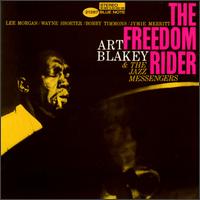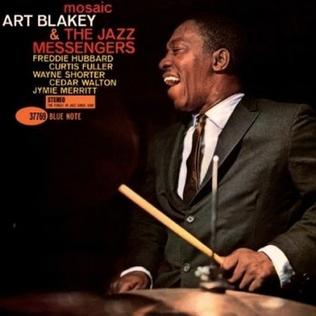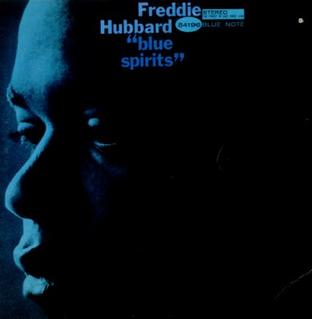
Henry "Hank" Mobley was an American hard bop and soul jazz tenor saxophonist and composer. Mobley was described by Leonard Feather as the "middleweight champion of the tenor saxophone", a metaphor used to describe his tone, that was neither as aggressive as John Coltrane nor as mellow as Lester Young, and his style that was laid-back, subtle and melodic, especially in contrast with players like Coltrane and Sonny Rollins. The critic Stacia Proefrock claimed him "one of the most underrated musicians of the bop era." Mobley's compositions included "Double Exposure," "Soul Station", and "Dig Dis," among others.

Someday My Prince Will Come is the seventh studio album by Miles Davis for Columbia Records, catalogue CL 1656 and CS 8456 in stereo, released in 1961. Recorded at Columbia's 30th Street Studio in Manhattan, New York City, it marked the only Miles Davis Quintet studio recording session to feature saxophonist Hank Mobley.

Soul Station is an album by jazz saxophonist Hank Mobley that was released in 1960 by Blue Note Records. It is considered by many critics to be his finest album.

The Freedom Rider is an album by jazz drummer Art Blakey and his group the Jazz Messengers, recorded in 1961 and released in 1964 by Blue Note Records. Continuing Blakey's distinct brand of hard bop, this album features compositions from Wayne Shorter, Lee Morgan, Blakey himself, and Kenny Dorham, a former Jazz Messenger. This was the final album by this particular edition of the Jazz Messengers, who had been together for 18 months, as Lee Morgan left after this album and was replaced by Freddie Hubbard.

Free for All is a jazz album by Art Blakey & the Jazz Messengers released on Blue Note. Recorded in February 1964, it was released the following year. It was originally titled Free Fall.

Trane's Blues is a compact disc credited to the jazz musician John Coltrane, released in 1999 on Blue Note Records, catalogue 98240. It comprises recordings from sessions for Blue Note and United Artists Records as a sideman for Paul Chambers, Sonny Clark, Johnny Griffin, and Cecil Taylor that were issued respectively on their Whims of Chambers, Sonny's Crib, A Blowin' Session, and Hard Driving Jazz albums. Two selections are from Coltrane's own 1957 Blue Train, and "One for Four" had been previously unissued. "Trane's Blues" had been issued on the compilation High Step in 1975, previously known as "John Paul Jones" and named after himself, the bass player Chambers, and the drummer Philly Joe Jones. Like Prestige Records before them, as Coltrane's fame grew long after he had stopped recording for the label, Blue Note used varied recordings, often those where Coltrane had been merely a sideman, and reissued them as a new album with Coltrane's name prominently displayed. In this case, the Big Four conglomerate EMI continued that earlier practice.

Johnny Griffin Vol. 2 is an album by jazz saxophonist Johnny Griffin, recorded in April 1957 and released in September or October of the same year on the Blue Note label. It was reissued in 1999, featuring an alternate take of "Smoke Stack."

Introducing Wayne Shorter is the debut album by jazz saxophonist Wayne Shorter. It was recorded on November 9th and 10th, 1959, at Bell Sound Studios in New York City. It features five Shorter compositions, plus Kurt Weill's "Mack the Knife”, performed by a quintet featuring trumpeter Lee Morgan, pianist Wynton Kelly, bassist Paul Chambers and drummer Jimmy Cobb. Shorter played with Morgan in the front line of Art Blakey's Jazz Messengers at this time while Kelly, Chambers and Cobb were the widely celebrated rhythm section with Miles Davis.

Caravan is a jazz album released by Art Blakey and the Jazz Messengers in February 1963. It was Blakey's first album for Riverside Records after he signed with them in October 1962. The songs were recorded at the Plaza Sound Studio in New York City, on October 23–24, 1962 The producer was Orrin Keepnews who also supervised the album's remastered re-release on CD.

Mosaic is a studio album by Art Blakey and the Jazz Messengers, released in January 1962 through Blue Note Records. The album's performers included Wayne Shorter, Freddie Hubbard (trumpet), Curtis Fuller (trombone), Cedar Walton (piano), Jymie Merritt (bass) and Art Blakey (drums). They recorded and performed together from 1961 into 1964. Hubbard and Walton became permanent members of the group following the 1961 departures of trumpeter Lee Morgan and pianist Bobby Timmons. The Mosaic recording session featured no alternate takes and, therefore, has yielded no bonus material in reissue.

Buhaina's Delight is a jazz album released by Art Blakey and the Jazz Messengers in 1963. Produced by Alfred Lion, the album was recorded in two sessions on November 28, 1961 and December 18, 1961 at Van Gelder Studio in Englewood Cliffs, New Jersey. The album was released by Blue Note Records in July 1963 after Blakey had moved to Riverside Records in late 1962.

Workout is an album by jazz tenor saxophonist Hank Mobley released on the Blue Note label in 1962. It features performances by Mobley, pianist Wynton Kelly, bassist Paul Chambers, guitarist Grant Green, and drummer Philly Joe Jones. The album was identified by Scott Yanow in his Allmusic essay "Hard Bop" as one of 17 Essential Hard Bop Recordings. In October 2014, it was released in Japan on SHM-CD, featuring a previously unissued take of "Three Coins in the Fountain".

Gettin' Together is a 1960 jazz album by saxophonist Art Pepper playing with Conte Candoli, Wynton Kelly, Paul Chambers, and Jimmy Cobb.

Horace Silver and the Jazz Messengers is a 1956 repackage of 1955 10” LPs by jazz pianist Horace Silver with drummer Art Blakey and featuring Hank Mobley on tenor saxophone, Kenny Dorham on trumpet, and Doug Watkins on bass. By the time this repackage was released, this quintet had named themselves the Jazz Messengers, and the band name on the label reflected that. These recordings helped establish the hard bop style. Scott Yanow on Allmusic describes it as "a true classic". Originally released as an LP, the album has subsequently been reissued on CD several times.

Here's Lee Morgan is an album by jazz trumpeter Lee Morgan originally released on the Vee-Jay label. It was recorded on February 8, 1960 and features performances by Morgan with Clifford Jordan, Wynton Kelly, Paul Chambers and Art Blakey.

Peckin' Time is an album credited to saxophonist Hank Mobley and trumpeter Lee Morgan recorded by the Blue Note label on February 9, 1958 and first released as BLP 1574 (mono). It features the two playing in a quintet rounded out by pianist Wynton Kelly, bassist Paul Chambers, and drummer Charlie Persip.

The Turnaround! is an album by jazz tenor saxophonist Hank Mobley recorded on March 7, 1963 and on February 4, 1965. It was released in 1965 by Blue Note Records. It features performances by Mobley with trumpeter Donald Byrd, pianist Herbie Hancock, bassist Butch Warren and drummer Philly Joe Jones from the earlier session and trumpeter Freddie Hubbard, pianist Barry Harris, bassist Paul Chambers and drummer Billy Higgins from the latter.

Goin' Up is an album by trumpeter Freddie Hubbard released on the Blue Note label in 1961. It features performances by Hubbard, Hank Mobley, McCoy Tyner, Paul Chambers and Philly Joe Jones.

Blue Spirits is an album by trumpeter Freddie Hubbard released on the Blue Note label. It would be his last studio album for Blue Note, recorded in the 1960s. It features performances by Hubbard, James Spaulding, Joe Henderson, Harold Mabern, Jr., Larry Ridley, Clifford Jarvis, Big Black, Kiane Zawadi, Hank Mobley, McCoy Tyner, Bob Cranshaw, Pete LaRoca. The CD release added tracks from a 1966 session featuring Hosea Taylor, Herbie Hancock, Reggie Workman, and Elvin Jones.

Kyoto is an album by Art Blakey's Jazz Messengers, recorded in 1964 and released on the Riverside label.




















